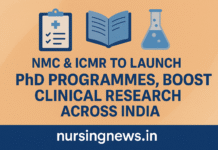The Central Government has released its official update that it has successfully built the capacity and infrastructure for conducting a whopping 500,000 consultations every day under the NDHM (National Digital Health Mission). This has been confirmed officially by the Union Health Ministry recently. The highly ambitious programme launched on the 15th of August, 2020, by Prime Minister Narendra Modi, will aim at developing a centralized system for unique identification of each participating citizen.
Joint Secretary, Ministry of Health and Family Welfare, Lav Agarwal, has stated that the health ID will be storing all the medical records of every individual. The activities have already started in select Union territories throughout India as part of the pilot phase according to him. Agarwal has also confirmed that the required capacities and other infrastructure have already been created for taking the initiative forward in the future. 500,000 consultations can take place on a daily basis as per his statement while he also highlighted the mission approach and emphasis on IT, making sure that the integrity of data and privacy are not compromised.

More about NDHM
India has tied up with the Netherlands for implementing the National Digital Health Mission (NDHM). This alliance may lead to unlocking the incremental economic value to the tune of $200 billion with the digital health sector growing rapidly as per the statements issued by the Central Government. Experts have stated that the digital health sector in the country is witnessing 18% of growth (CAGR or Compounded Annualized Growth Rate) and this could touch billions of dollars in the present year as well. Experts have also talked of how India has already garnered more than 58 proposals for business throughout 18 business areas in the field of digital health. Reports have identified a whopping 1.8 lakh unique health IDs already created under the pilot basis for 6 Indian States and Union territories as part of the NDHM’s mission. These regions are Dadra & Nagar Haveli, Andaman & Nicobar, Ladakh, Chandigarh, Lakshadweep, and Puducherry.
This has been confirmed by the NHA (National Health Authority), which is the implementing agency for the entire program. The Health ID under the aegis of the National Digital Health Mission is absolutely free of cost, based on consent and voluntary and the application may be created via the mobile phone number or Aadhar number in tandem with providing other basic details. This ID will enable citizens to easily track all their health information/data while sharing it solely with verified healthcare providers and doctors whenever required post informed consent as per the statement issued by the Central Government.
There is a voluntary option for opting out and users can get their data erased anytime they wish. The Government is of the opinion that these health IDs will be used for the creation of a safer and more efficient system of digital health records. Users may also link their health IDs to their family members and newly born children while tracking vaccination details as well, according to the NHA. The Government has assured of all necessary measures for strengthening overall data privacy while measures will be implemented for safeguarding confidentiality pertaining to health-related data of people under the National Digital Health Mission (NDHM).
NDHM- Could be a future game-changer for Indian healthcare systems
The National Digital Health Blueprint Committee Chairman, J Satyanarayana, has stated that the blueprint for the NDHM was finalized late in 2019 and it is now being implemented as a pilot project initially. A federated model of architecture is being used for adhering to global standards across the entire program according to him. He also added that the approach is to start small at the beginning and thereafter scale up swiftly with the insights derived from the pilot project. The NDHM comes with four major features, namely personal health records, National Health ID, health facility registry, and also Digi Doctor. Sometime later, it may include telemedicine-based services, e-pharmacy, and other solutions. The regulatory framework is currently being established for the same.
Implementing this digital health blueprint will enable higher productivity while spurring added benefits of a whopping $250 billion to the GDP of the country throughout the next decade as per reports recently released by the Boston Consulting Group (BCG) and Federation of Indian Chambers of Commerce and Industry (FICCI). Reports have also highlighted how a whopping 60 million Indian citizens are forced into poverty annually owing to skyrocketing health expenditure, 60% of which are borne by citizens from their own pockets. This leads to major limitations on the welfare of individuals while impacting the overall economic growth and development of the country as well. This percentage should decline considerably over the next decade owing to the implementation of digital healthcare services which may help in diagnosing several conditions early on while helping in filtering out healthcare professionals who are not suitably qualified.
Prime Minister Narendra Modi has already stated that the country is working for setting out a firmly established system of delivery for COVID-19 vaccines. The digitized network and digital health IDs will enable swift immunization of citizens from COVID-19. The National Digital Health Mission (NDHM) was announced by Prime Minister Narendra Modi on Independence Day (15th August 2020) and as per the last update by the National Health Authority (NHA), 9,100,000 IDs have already been issued in the States and Union Territories under the pilot phase. Prime Minister Modi has rightly stated that India remains at the very forefront of developing vaccines for the COVID-19 crisis with some vaccines being in a highly advanced stage of development as well.
He made this statement at the Grand Challenges Annual Meeting which was also addressed by Bill Gates and other luminaries. Prime Minister Modi also added that beyond the coronavirus as well, the country is known for its time-tested capacity for the production of vaccines and quality medicines at lower costs. He added that more than 60% of vaccines used for immunization across the globe were manufactured in India itself. The NDHM will be a major game-changer for digital healthcare systems in India going forward.









